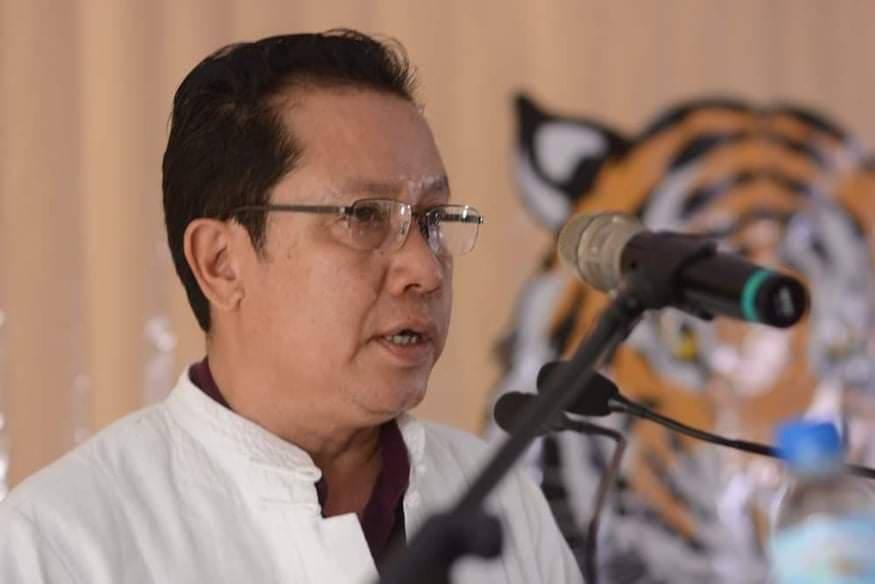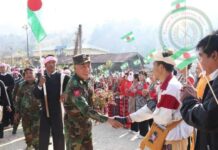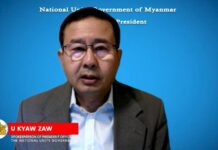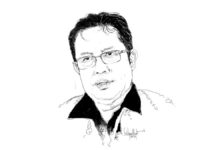February 12, 2024, commemorates the 77th Union Day of Myanmar. In alignment with this occasion, the Shan Nationalities League for Democracy (SNLD) and twelve other political parties have jointly unveiled a drafted constitution grounded in federal democratic principles. On this significant development, Sai Hseng Yawd from SHAN interviews with SNLD’s spokesperson, Sai Leik.
Q: What are the reasons why a federal democratic constitution is crucial for Myanmar?
A: The ongoing drafting of our constitution holds paramount importance as it signals a pivotal shift in our country’s political landscape. Our ongoing political crisis has been suffered by a series of military coups in 1958, 1962, 1988, and 2021. In addition, the military-drafted constitution has contributed to protracted civil unrest by neglecting to adequately represent the genuine concerns of its people. Therefore, there is an urgent need to create a new constitution that truly represents and serves the interests of the people.
Q: How long does it take to draft this constitution? What are the challenges?
A: It required nearly three years to draft this constitution, which was initiated three days after Min Aung Hlaing assumed power through a military coup in 2021, undertaken by members of the United Nationalities Alliance (UNA). The impetus behind this constitutional drafting stemmed from several factors: firstly, the rejection of the military junta’s illegitimate governance; secondly, the acknowledgment of the 2008 constitution’s obsolescence as a viable political framework; and thirdly, the recognition of the necessity for a new constitution tailored to the needs of the nation. During this period, concerted efforts were made to encourage the involvement of all stakeholders. Notably, the drafting process did not strictly adhere to the UNA framework. Numerous challenges were encountered throughout this endeavor. For instance, certain political parties grappled with indecision regarding their participation due to the incarceration of their leaders. Others faced obstacles related to the re-registration of their political entities. Additionally, parties such as Kokang and Kayan encountered difficulties in actively engaging in the process due to ongoing conflicts within their respective regions.
Q: SNLD presided over the drafting of this constitution; did the UNA members concur? Alternatively, how did it come to be?
A: It should be noted that we exerted leadership in this matter. To understand the dynamics at play, it is necessary to revisit the events of 1990. Following the 1990 elections, where we secured the second-largest number of seats, the State Law and Order Restoration Council (SLORC) disregarded the electoral outcome and disbanded political parties. At that juncture, the Shan Nationalities League for Democracy (SNLD) remained the sole recognized party. Subsequently, various political entities including those representing the Mon, Chin, Karen, Kachin, and Arakan coalesced to establish the Unity Nationalities Alliance (UNA). Given SNLD’s status as the only legitimate party, it naturally assumed a leadership position within the alliance. This pattern persisted into the 2020 general elections, wherein SNLD garnered numerous seats, while other UNA member parties secured only one or two seats, or in some cases, failed to secure parliamentary representation altogether. Consequently, SNLD has consistently assumed a leadership role. Nevertheless, our collaborative efforts are characterized by mutual respect and inclusivity.
Q: How is the next stage of this constitution to be prepared?
A: This constitution was brought for a number of reasons. Firstly, our enduring political challenges have been intrinsically linked to constitutional deficiencies. Without a constitution that upholds justice and fairness while addressing the interests of its people, the resolution of our political issues remains elusive. Secondly, concerted efforts are imperative to dismantle the prevailing military-dominated political structure. Thirdly, despite our ongoing struggle against military hegemony, the absence of a just and fair constitution poses a risk of national fragmentation. So, with all these concerns, we united to draft this constitution. The process involves three distinct steps, with the determination of which step to undertake contingent upon prevailing circumstances.
Q: How do you intend to disseminate information regarding this constitution to the general public?
A: Within our People’s Representatives Committee for Federal (PRCF), we have established a comprehensive framework that extends beyond political parties. This inclusive approach involves various segments of society, including young individuals, students, and activists who have actively opposed the military since the 2021 coup. Additionally, civil society groups and ethnic armed organizations contribute to the constitution drafting process. To facilitate a collective comprehension of the newly formulated constitution among these diverse stakeholders, we have initiated briefing sessions. These sessions serve as a platform for dialogue and exchange of perspectives. Moving forward, we are committed to ongoing engagement and collaboration with civil society organizations to ensure widespread dissemination of information to the public.
Q: As previously mentioned, the drafting of this constitution has been attributed to twelve political parties. Could you kindly identify those parties?
A: These political parties are the UNA members such as ALD, ZCD, KNP (Karen), KNP(Kayan), KNP(Khami), MNDP, SNSP, SSKDP, DNDP, UNDP and DNDP. Initially, the KNDC (Kachin) was involved but subsequently withdrew.
Q: Which of these political parties is the most challenging to negotiate with?
A: Dealing with the dictatorship is the most challenging aspect. Political means were employed to engage in negotiations with them, and this strategy will go on. Nevertheless, an ongoing challenge persists within our ranks regarding the interpretation of our confrontations with them. For instance, it is universally acknowledged that the military regime must be overthrown. We are opposed to the constitution of 2008 and intend to draft a new one. There are, however, differing opinions regarding this. Some consider armed resistance to be the only viable strategy for opposing the military regime, while others contend that defying their regulations constitutes an alternative method of resistance. Nevertheless, certain political parties that were incorporated under the constitution of 2008 are hesitant about breaking the law for fear of repercussions for their organizations. It therefore requires time to explain them. Right now, this is the most challenging situation for us.
Q: Is this constitution consistent with the military election plans, in your opinion?
A: Whatever the military strategy means, our actions are unrelated to theirs. However, it is pivotal within this constitution that the military operates under the authority of the civilian government. The drafting of this new constitution is aimed at securing a prosperous future for our nation, fostering an environment conducive to peace for all citizens. Central to its design is the principle that sovereign power rests with the people. Consequently, we are indifferent to the viability of the general elections organized within the framework outlined by the 2008 constitution. Our stance remains resolute: we reject and will never endorse any plans proposed by the military.
Q: What message do you wish to convey to the public regarding this initial constitution that you have prepared?
A: Since 1958, the underlying issue driving our political turmoil has been rooted in constitutional deficiencies. While this prepared draft constitution may not offer an immediate solution to this crisis, it remains imperative for the future stability of our nation. It is incumbent upon all of us to collaboratively strive towards realizing this constitution, recognizing its significance in charting a course toward a more prosperous future for our country.















Leave a Comments